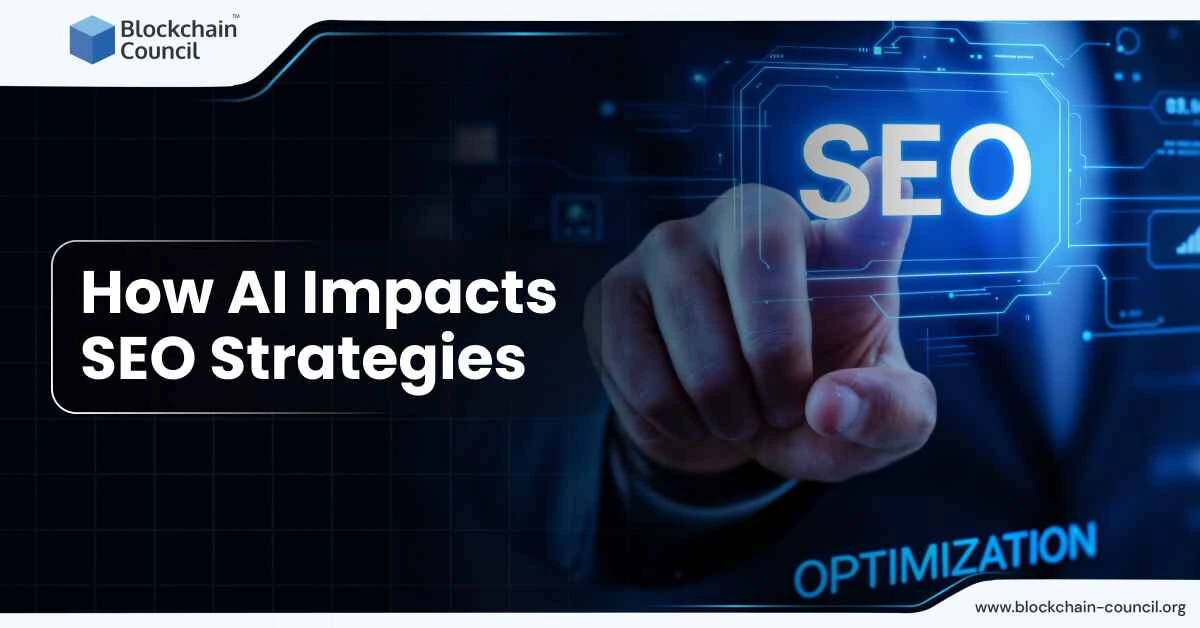
- Blockchain Council
- November 18, 2024
Artificial intelligence (AI) is quickly changing the way search engine optimization (SEO) functions. As AI continues to develop, professionals in SEO must adjust to these shifts.
AI’s Expanding Role in Search Engines
AI-powered search engines such as Google, Bing, along with newer systems like ChatGPT and Perplexity, are altering both how people search and how search engines analyze and rank information. AI is now involved in nearly every part of SEO, from creating content to determining ranking factors and enhancing the user experience.
Search engines are now putting more emphasis on the quality of content, user interactions, and the overall experience provided. AI-driven algorithms now evaluate data in more detail, which helps these engines offer results that better match users’ search intentions.
These systems can even personalize results, delivering varied outcomes based on users’ browsing habits. This more advanced AI also handles natural language queries better, influencing how businesses need to optimize their content for traditional searches and voice-based platforms.
The Certified Artificial Intelligence (AI) Expert™ certification helps you grasp how AI tools can improve SEO and make digital marketing more effective.
Adjusting SEO for AI-Enhanced Search Engines
To remain relevant in this changing SEO environment, businesses and SEO experts need to adjust in a few key areas:
1. Content Quality and User Interaction
While content quality remains essential, AI now places a stronger emphasis on user engagement. AI algorithms give preference to content that is not just informative but also well-organized and engaging. Additionally, metrics like loading speeds, mobile-friendliness, and easy website navigation now significantly affect rankings.
Websites offering a smoother experience are more likely to perform well. Content also needs to follow the E-E-A-T guidelines (Experience, Expertise, Authoritativeness, Trustworthiness). These factors help AI gauge the credibility of a source, which can impact rankings. Simply creating content is no longer enough. It needs to demonstrate expertise and reliability to stand out.
2. Optimizing for AI-Integrated Features
AI has introduced new elements to how search results are displayed. Features like Google’s “Search Generative Experience” (SGE) and zero-click searches are becoming increasingly common. For example, Google often displays direct answers at the top of search results. This has led to less organic traffic to websites, as people find what they need directly in search results without having to click through.
To address this, businesses should focus on optimizing their content to appear in rich results like featured snippets. Using structured data like schema markup helps AI better understand and rank content. This positioning is critical in preventing a drop in organic traffic from these zero-click searches.
3. Voice Search and Conversational Queries
AI-driven voice tools such as Siri, Google Assistant, and Alexa are influencing how users perform searches. Voice searches are generally longer and more conversational than typical keyword-based searches. SEO strategies should now focus on optimizing for natural, question-based searches. This change is particularly important for local businesses, as many voice searches are location-focused, such as “near me” queries.
4. Visual Search and AI Features
Visual search is another emerging trend, where AI processes images to return search results based on visual content. Platforms such as Google Lens and Pinterest have incorporated AI to improve visual search functions. Businesses now need to focus on optimizing their images with high-quality visuals and relevant descriptions or alt text to enhance visibility in search results. Google Lens, for example, can analyze real-time video frames and provide related search results based on what is seen.
5. Personalization and Predictive Search
AI has improved the personalization of search results by evaluating past interactions and preferences, tailoring the outcomes accordingly. Predictive search, where AI suggests queries based on what users are likely searching for, is another significant change. SEO strategies must now create content that aligns with specific user groups and their unique search intentions. By examining user behavior and using data insights, businesses can stay competitive in this more personalized search landscape.
Using AI Tools for SEO Success
A variety of AI tools now assist SEO experts in both creating and optimizing content. Tools like Jasper and Copy.ai generate content, while platforms like Clearscope and SurferSEO provide suggestions based on data analysis. However, it’s vital for businesses not to rely entirely on AI for content creation.
While AI can speed up the content process, human input is still necessary to ensure accuracy, quality, and relevance. AI also helps with tracking SEO progress. Platforms like Google Search Console and others can now monitor AI-influenced changes in user behavior, helping businesses fine-tune their SEO strategies using real-time data insights.
Crafting the right AI prompts can enhance SEO content strategies using AI tools. That’s why becoming a Certified Prompt Engineer™ can sharpen your approach to optimizing search results.
Ethical Concerns and Potential Challenges
As AI takes on a larger role in SEO, it brings certain ethical challenges. For example, the increasing use of AI-generated content may create issues regarding originality, quality, and reliability. To maintain integrity, businesses must ensure AI-generated content is accurate, free from plagiarism, and meets the expectations of the target audience. Moreover, as AI becomes more integrated into SEO practices, companies need to maintain transparency to ensure trust in the content provided.
If you want to strengthen your knowledge of AI, the Master Artificial Intelligence (AI) Learning Path provides valuable skills for improving SEO techniques.
Final Thoughts
AI’s impact on SEO is significant, and adapting to these changes is key for businesses to remain competitive. From optimizing for voice and visual search to improving content quality and user experience, success depends on understanding how AI is shaping search behavior. By focusing on user personalization, adjusting to AI-driven search results, and using AI tools thoughtfully, businesses can refine their SEO approaches and continue to thrive as AI becomes more dominant in this space.
AI-powered content creation requires staying updated with industry trends. Our Unlimited Learning Subscription (AI) ensures you have access to the latest resources to improve your SEO results.





































































 Guides
Guides News
News Blockchain
Blockchain Cryptocurrency
& Digital Assets
Cryptocurrency
& Digital Assets Web3
Web3 Metaverse & NFTs
Metaverse & NFTs
